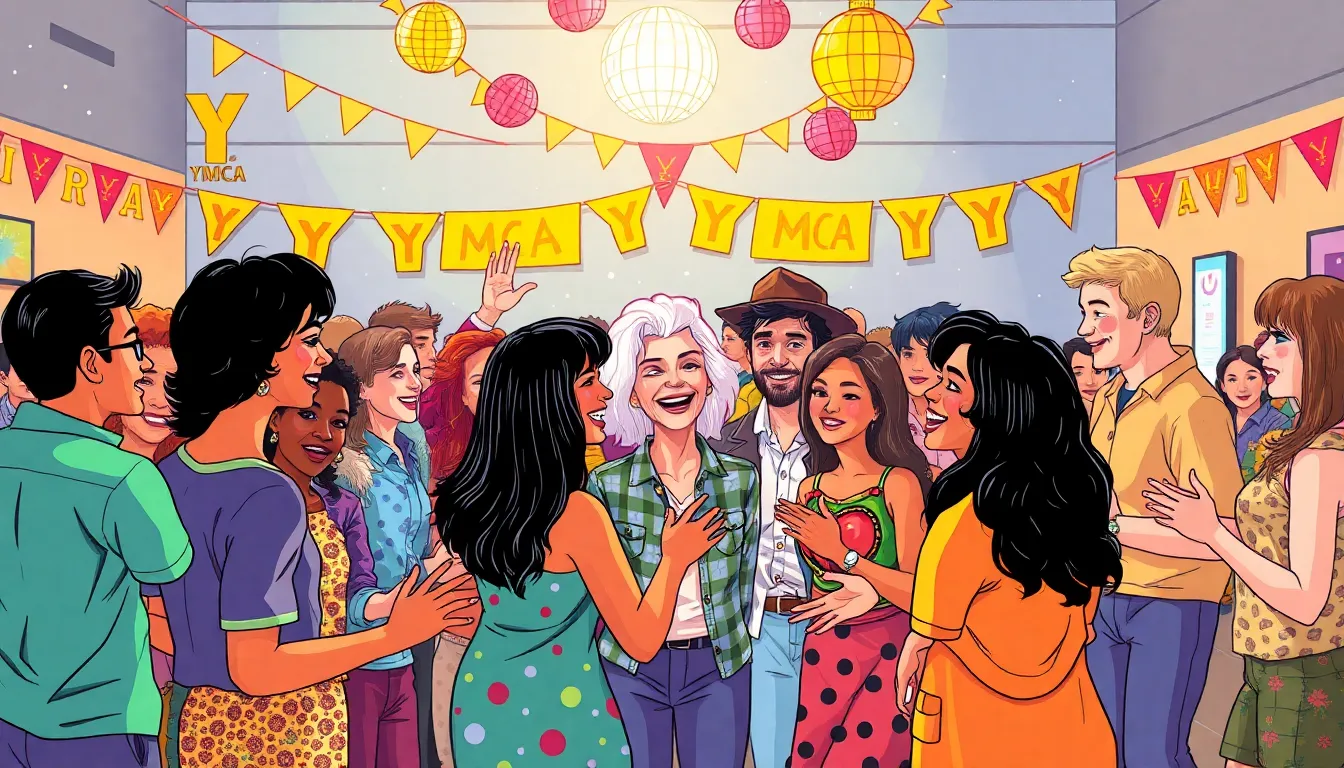When the catchy tune of “YMCA” hits the airwaves, it’s hard not to feel the urge to join in on the fun. But have you ever stopped to wonder what this iconic anthem is really about? Beyond the catchy chorus and lively dance moves lies a message that resonates with many.
Originally released by the Village People in 1978, the song isn’t just a call to get up and do the famous dance; it’s a celebration of community, acceptance, and the joys of youth. It invites listeners to embrace their individuality while finding a sense of belonging. So let’s dive into the vibrant world of “YMCA” and uncover the deeper meaning behind this timeless classic that still gets people on their feet today.
Table of Contents
ToggleOverview of YMCA
The song “YMCA” represents a vibrant celebration of community life. Released by the Village People in 1978, it quickly became an anthem for acceptance and togetherness. Youth often find themselves seeking belonging, and this track captures that sentiment.
Many interpret the lyrics as an invitation to embrace individuality. Listeners hear messages encouraging them to find support in communal spaces like the YMCA. Whether it’s through recreational activities or social programs, these settings provide avenues for connection.
Dancing plays a crucial role in the song’s popularity. The accompanying choreography, characterized by the iconic “Y-M-C-A” arm movements, fosters a sense of unity among participants. Gatherings often witness individuals express joy and connectivity through these dances.
Cultural significance extends beyond the dance floor. “YMCA” resonates with the LGBTQ+ community, often celebrated at pride events. Many individuals identify with the song as it promotes inclusivity and love.
Over the years, the song has seen numerous covers and adaptations. Each rendition highlights its timeless appeal and relevance. Information about the song’s background suggests it continues to inspire new generations.
Historical Context of the Song

“YMCA” by the Village People captures a significant moment in social history. The song reflects the cultural dynamics of its time, highlighting the role of youth organizations in community building.
Origin of the YMCA
The Young Men’s Christian Association, or YMCA, was founded in 1844 in London. Initially aimed at providing young men with a supportive environment, it expanded to offer recreational facilities and programs for all ages. By the 20th century, YMCAs became central to community life across the United States, promoting health, wellness, and social engagement. Local YMCAs serve as spaces where individuals can connect and participate in various activities together.
The Era of the Song’s Release
Released in 1978, “YMCA” reflects the vibrant disco era. This period was marked by a cultural shift toward freedom, self-expression, and inclusivity. The song emerged during a time when LGBTQ+ rights gained visibility, resonating with audiences seeking acceptance. Mainstream acceptance of diverse identities began to take root, and the YMCA symbolized a safe haven for marginalized communities. Its catchy melody and upbeat rhythm aligned perfectly with the energy of the disco movement, contributing to its widespread appeal.
Themes and Messages in YMCA
“YMCA” resonates deeply with themes of community and acceptance. It celebrates the joy of finding connection in shared spaces like the YMCA, where individuals from diverse backgrounds unite through activities. The song’s infectious energy invites everyone to participate, fostering a sense of belonging.
Celebration of Community
Community life takes center stage in “YMCA.” Gathering places such as the YMCA provide safe environments for social interaction, recreation, and growth. Shared experiences create lasting bonds among participants, reinforcing friendships and cooperation. The song highlights the importance of support networks, showcasing how togetherness cultivates joy and resilience. Uplifting lyrics encourage everyone to embrace communal activities, showcasing the benefits of joining forces in celebrations of diversity.
Rejection of Stereotypes
“YMCA” challenges stereotypes associated with masculinity and identity. It boldly encourages self-expression, breaking down barriers that confine traditional roles. The song embraces individuality while promoting acceptance of different lifestyles. Its cultural significance lies in its message that love and friendship transcend societal labels. By representing various identities, it fosters an inclusive environment where everyone feels welcome. Additionally, the song’s association with the LGBTQ+ community serves as a powerful statement against discrimination, further solidifying its message of acceptance.
Cultural Impact of YMCA
The song “YMCA” has made a significant mark on culture, reinforcing themes of community and acceptance. Its catchy tune has led to widespread recognition across various platforms.
Influence on Pop Culture
Pop culture heavily references “YMCA,” making it a staple at events like weddings and sports games. Memorable inclusion in films, television shows, and commercials highlights the song’s universal appeal. These appearances often evoke feelings of nostalgia, helping new audiences discover its meaning. Celebrations and gatherings frequently feature the dance, promoting participation among diverse groups. A blend of fun and social cohesion characterizes its role in contemporary culture.
YMCA in Media and Performances
Media portrayals often celebrate “YMCA” through live performances and tributes. Artists frequently cover the song, putting their unique spin on its upbeat melody. Major award shows and public events regularly showcase the choreography, inviting audience engagement. Additionally, pride parades embrace the anthem, representing love and inclusivity. Documentaries and retrospectives explore its historical significance, emphasizing the song’s continuing influence on generations.
The song “YMCA” transcends its catchy melody and dance moves to deliver a powerful message of community and acceptance. Its enduring legacy lies in its ability to unite individuals from diverse backgrounds while promoting self-expression and love. As a cultural touchstone, it continues to inspire new generations and remains a vibrant anthem at celebrations and pride events. The song’s roots in the supportive environment of the YMCA highlight the importance of belonging and resilience in today’s society. Through its joyful spirit and inclusive message, “YMCA” stands as a testament to the power of music in fostering connection and understanding.





